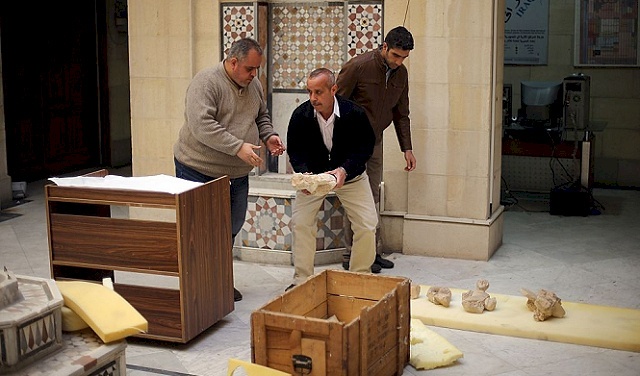
The Theft of Valuable Artifacts from the National Museum in Damascus
SadaNews - The National Museum in Damascus was robbed late Sunday into Monday, according to a source close to the museum's administration and a security source, with one stating that the theft involved gold pieces on display in the classical wing.
The years of the Syrian conflict since 2011 have devastated archaeological sites and valuable symbolic heritage, leading to the looting of tens of thousands of artifacts. However, the capital's museum remained largely unaffected, receiving rare artifacts from other regions to preserve them.
A source close to the museum administration confirmed that "the theft involved six artifacts that were on display in the museum's classical wing," a piece of information corroborated by another informed source, as reported by the "Agence France-Presse" news agency.
The close source stated that the stolen items are "gold castings".
The museum administration did not respond to inquiries, with one official merely stating that "the museum is closed for security reasons and will reopen next week."
No official statement has been released by the authorities yet.
For his part, a security source stated that "a number of museum employees and guards were held on Monday following the theft and were interrogated" before being released.
A responsible official from the Syrian Museums Administration explained that "security forces prevented staff from entering the exhibition halls since the theft occurred late Sunday into Monday."
No unusual activity was observed around the museum on Tuesday, which is typically a weekly closure day.
The classical wing is considered one of the most important wings in the museum, featuring rare pieces from various eras, including the Hellenistic, Roman, and Byzantine periods, collected from major archaeological sites in Syria.
Among the displayed artifacts are funerary beds, rare wall paintings, and stone statues.
The Directorate General of Antiquities and Museums in Syria had reopened the museum's doors on January 8, 2025, after having closed them on the eve of President Bashar al-Assad's ousting for fear of theft and looting.
The museum management confirmed at that time that "no violations occurred against the museum".
Several civilizations have succeeded one another in Syria, from the Canaanites to the Umayyads, including the Greeks, Romans, and Byzantines.
Archaeological sites and museums have not escaped the repercussions of the war, suffering significant damage, particularly in the ancient city of Aleppo and Palmyra.
In 2020, a report published by the "Gerda Henkel" Foundation and the Syrian Association for the Protection of Antiquities based in Paris indicated that more than 40,000 artifacts had been looted from museums and archaeological sites since the beginning of the war in 2011.
The chaos engulfing Syria at the height of the war under Bashar al-Assad's regime facilitated the smuggling of movable artifacts, such as coins, statues, and mosaic pieces, to various parts of the world, fostering a black market for antiquities.
The smuggling of artifacts generated millions of dollars in revenue, benefiting the "ISIS" organization and various fighting factions, or groups affiliated with previous government forces, as well as smuggling networks and less organized individuals.

Head and Neck Cancer: When 'Hoarseness' or 'Difficulty Swallowing' Signals Danger

"Luna Ring".. A Solar Ring Around the Moon Promises a New Era of Energy for Earth

New Updates to Hypertension Treatment Protocol

A New Comet Ignites Astronomers' Enthusiasm as They Await Its Survival from the Sun's Flam...

8 Daily Habits That Harm Your Heart Health.. How to Avoid Them?

Interactive Digital Photo Frame... Suited to Your Personality and Environment

Women or Men... Who Views Artificial Intelligence as More Dangerous?

